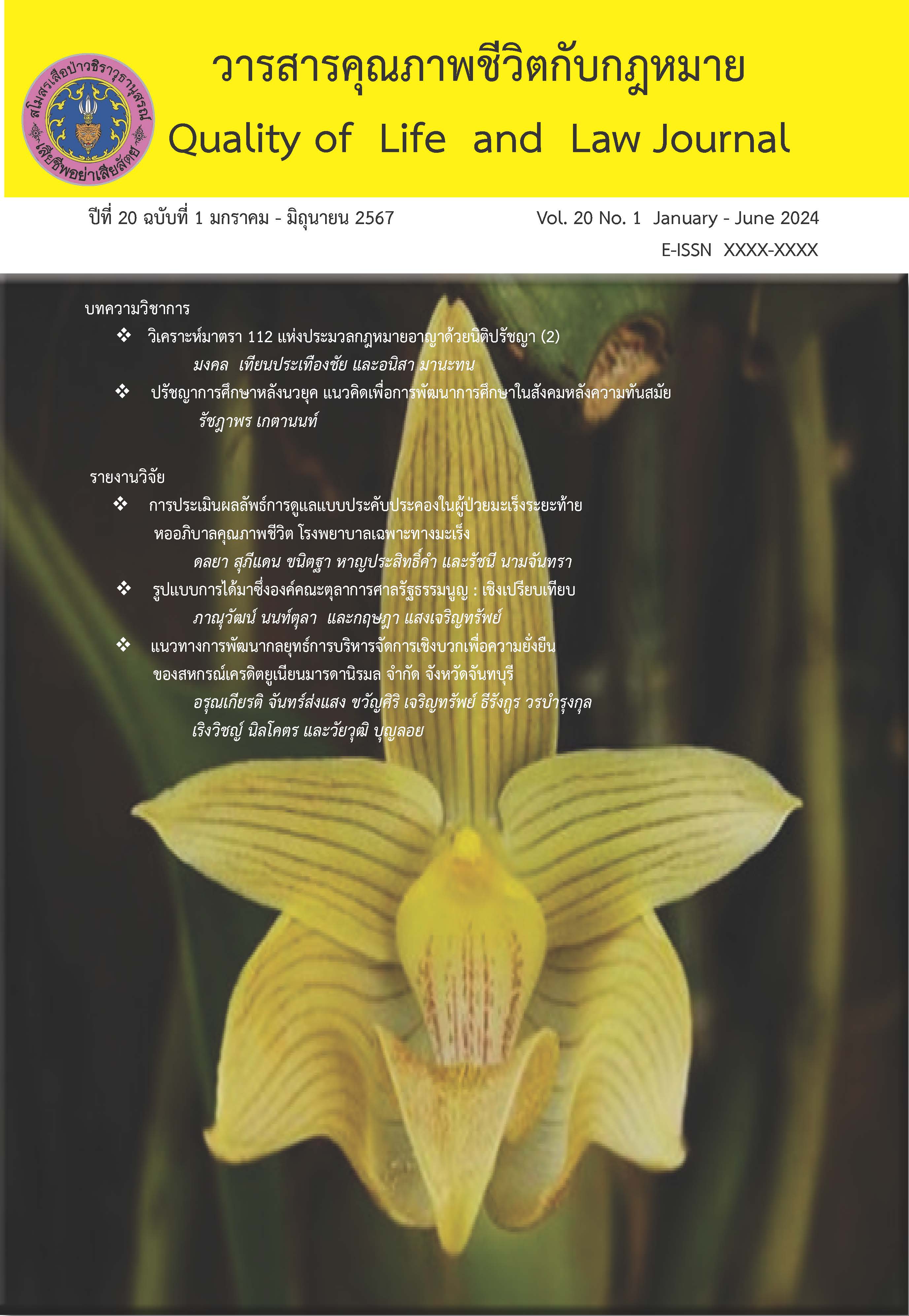The Analysis of Article 112 of The Thai Criminal Code Through Legal Philosophy
Main Article Content
Abstract
The academic article “Analysis of Article 112 of the Thai Criminal Code through Legal Philosophy (2)” has two objectives: 1) To study the substance of the law and the enforcement of Article 112 to determine the true essence of the law according to which legal philosophy concept. 2) To study There are different opinions on amending Article 112 as to what kind of legal logic or philosophy should be used. First, it was found that the substance of the law (criminal offenses and penalties) and the enforcement of Article 112 were mostly inconsistent with the essence of the law in the concept of sociological jurisprudence, Legal Realism, and the concept of the rule of law in the Western Legal Philosophy. that is objectively free from bias and can be corrected without relying on any bias. Second, it was found that different opinions regarding the amendment of the provisions of Article 112 were held or dominated. (in the good or the bad) with a framework of messages, Ideas, knowledge, beliefs, and truths in various forms such as religious, educational, social, economic, political, and administrative forms. Therefore, causing different opinions. Importantly, do not emphasize philosophical logic to the point that bias can easily penetrate and affect justice and freedom (rights, duties, and responsibilities) in democracies and governance systems. The solution should be to use wisdom. Reason and good intentions or the truth and truth to achieve a balance in the interests of all parties in society that changes with the times. With the approach of philosophy and legal philosophy, it is believed that it will create respect for different opinions. and live together for Justice.
Article Details

This work is licensed under a Creative Commons Attribution-NonCommercial-NoDerivatives 4.0 International License.
- บทความหรือข้อคิดเห็นใดๆ ในวารสารคุณภาพชีวิตกับกฎหมายเป็
- กองบรรณาธิการไม่สงวนสิทธิ์
References
กฎหมายลักษณะอาญา ร.ศ.127. (1 มิถุนายน รศ.127). ราชกิจจานุเบกษา กรุงเทพมหานครในพระบรมมหาราชวัง เล่ม 25 ฉบับพิเศษ หน้า 206.
คำสั่งของคณะปฏิรูปการปกครองแผ่นดิน ฉบับที่ 41. (21 ตุลาคม 2519). ราชกิจจานุเบกษา เล่ม 93 (ฉบับพิเศษ) ตอนที่ 134 หน้า 46.
จรัญ โฆษณานันท์. (2561). นิติปรัชญา (พิมพ์ครั้งที่ 20). สำนักพิมพ์มหาวิทยาลัยรามคำแหง.
ประมวลกฎหมายอาญา โดยพระราชบัญญัติให้ใช้ประมวลกฎหมายอาญา พ.ศ.2499. (15 พฤศจิกายน 2499). ราชกิจจานุเบกษา เล่ม 73 (ฉบับพิเศษ) ตอนที่ 95 หน้า 1.
ปรีดี เกษมทรัพย. (2551). นิติปรัชญา (พิมพ์ครั้งที่ 9). โครงการตำราและเอกสารประกอบการสอน คณะนิติศาสตร์ มหาวิทยาลัยธรรมศาสตร์.
พนารัตน์ มาศฉมาดล. (ม.ป.ป.). แนวความคิดในการจัดทำกฎหมายลักษณะอาญา ร.ศ.127. http://wiki.kpi.ac.th/index.php?title.
พงษ์ธร ธัญญสิริ. (2552). ย้อนดูอดีตเพื่อก้าวสู่อนาคตกฎหมายอาญาไทย. วารสารกระบวนการยุติธรรม, 2(2), 133-146.
มหาจุฬาลงกรณราชวิทยาลัย. (2539). พระไตรปิฎกภาษาไทย ฉบับมหาจุฬาลงกรณราชวิทยาลัย (เล่ม 16). http://www.geocities.ws/tmchote/tpd-mcu/tpd16.htm.
วรเจตน์ ภาคีรัตน์.(2561). ประวัติศาสตร์ความคิดนิติปรัชญา. สำนักพิมพ์อ่านกฎหมาย.
สมเด็จพระพุทธโฆษาจารย์ (ป.อ. ปยุตฺโต). (2562). พุทธธรรม ฉบับปรับขยาย. (พิมพ์ครั้งที่ 22) https://www.watnyanaves.net/uploads/File/books/pdf/buddhadhamma_extended_edition.pdf
สมภาร พรมทา. (2561). คำบรรยายวิชาปรัชญาภาษา (ปภ.09) ตอนที่เก้า: ความจริงสี่แบบในศูนย์ศึกษาพุทธปรัชญา. มหาวิทยาลัยมหาจุฬาลงกรณรราชวิทยาลัย, http://csbp.mcu.ac.th/
สมยศ เชื้อไทย. (2559). นิติปรัชญา (พิมพ์ครั้งที่ 19). วิญญูชน.
Ilaw - freedom. (2015). วิวัฒนาการของกฎหมายหมิ่นประมาทพระมหากษัตริย์ ในรอบ 200 ปี ตามบริบทสังคมการเมือง, https://freedom.ilaw.or.th/blog/Historyof112.


